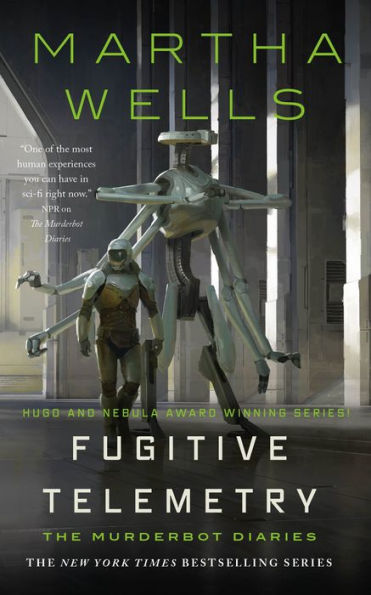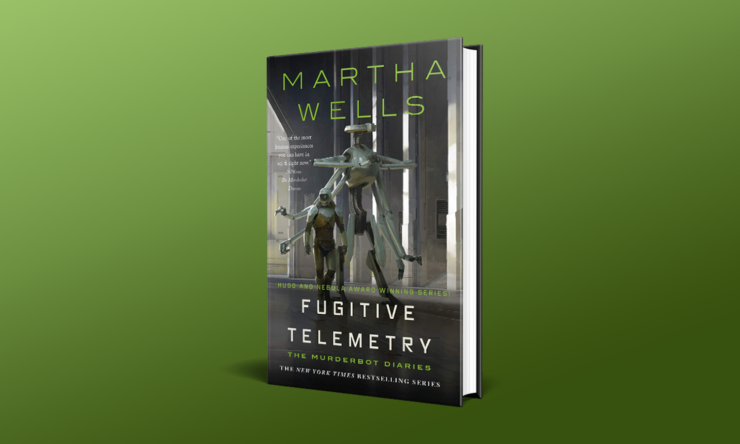It’s been almost one long year since Network Effect dropped, and let’s face it: the world is ready for more Murderbot. Dry wit, misanthropy, and space adventures are promises delivered in full in this month’s 6th installment of Martha Wells’ Murderbot Diaries, ambiguously titled Fugitive Telemetry. Though the series’ last entry was a novel, Telemetry brings us back to the novella form, and makes for a perfect, bite-sized afternoon read (or, if you’re like Murderbot itself, you can binge reread the entire series in one go).
Fugitive Telemetry is as self-contained and action-packed as the previous books, however it leans into its mystery plotline in a subtly different way. The novella follows Murderbot as it investigates the murder of a stranger on Preservation Station; but this time, it isn’t working alone, or even begrudgingly accepting the help of its human charges/companions. Instead Murderbot is part of a formal investigation team from Station Security and is forced at times to work within the system and prove its trustworthiness to its disbelieving new coworkers. The dynamic itself isn’t unfamiliar, but adding on the murder investigation takes the novella into full police procedural workplace comedy territory (Brooklyn Nine-Nine, eat your heart out).
Buy the Book


Fugitive Telemetry
Plenty of old favorites return as well: Murderbot’s old crew (Mensah, Pin-Lee, Ratthi, etc.) hover on the mystery’s periphery, and the question of GrayCris’ involvement in the case is ever-present. The novella introduces more bots and sneaking hints of bot class consciousness, and more begrudging allyship with side characters that could easily drive their own spin-off stories. Sadly, at least for this reader, ART is only mentioned in passing.
In spite of these familiar elements and the series’ characteristic lightness of tone, Telemetry does subtly deepen Murderbot’s larger plot, introducing more life outside of Corporation Rim and unfolding both more of CR’s sins as well as the eminent resistance movements against them. It is honestly impressive how adding new iterations of the same elements can feel like a building-towards-something rather than mere repetition. I trust this series to take me to some kind of conclusion, in part because each self-contained piece is so fun and satisfying.
I also continue to be impressed with how Murderbot deals with narratives of prejudice. Fictional metaphors for prejudice too often veer toward attempts at cleanly-mappable allegory, and manage to be simultaneously didactic, ridiculous, and disturbing. Stories like X-Men will compare being Black to having eyes that literally kill people (and don’t get me wrong— Magneto was right—but I shouldn’t have to explain that implying that Black people are born dangerous is both actively violent and a bad metaphor). Murderbot, though, isn’t a stand-in for any other oppressed group, as much as some of us might see ourselves in its outsider-status, hatred of ally condescension, and “not applicable” gender. The prejudice it faces isn’t because it is socially-coded as a weapon, but because it is a weapon, and so the shape those redemption stories take is fundamentally different. Murderbot isn’t a story about simply learning to love yourself as you are, but of reckoning with the decision to not be the thing you were born to be. It’s about learning to trust even in the midst of justifiable fear. It’s also—for all its death and mayhem—a soothing escape from reality, the likes of which Murderbot itself would approve.
All in all, Fugitive Telemetry is a delightful entry in a continually delightful series. Rest assured you can sink into this murder mystery like a warm, robotic bath.
Fugitive Telemetry is available from Tordotcom Publishing.
Em Nordling is a writer & PhD student in Atlanta, GA.










